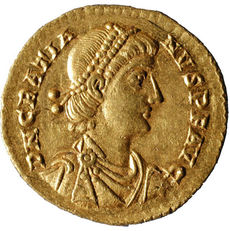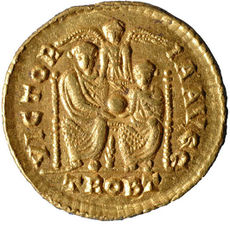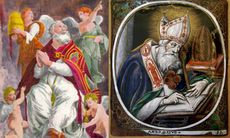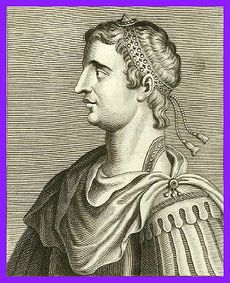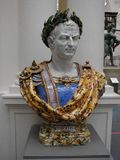Gratian
“Rome belongs to you Pappy Damasus. I am off to Milan.”
– Gratian
“I can run, jump and wrestle. Can we organise a match against the Germans?”
– Gratian
Three words sum up the reign of emperor Gratian (359-383). Piss, poor and pathetic. So low were the opinions of his own government of their emperor's abilities that they insisted he share the responsibility of running the Western Roman Empire with Valentinian II, a mighty warrior - aged 5. Short of sticking a purple diadem on a goat, the authorities in Rome were already marking the time when Gratian could be safely shunted out of his job and re-apply as a cleaner at the imperial palace.
Permanent juvenile[edit | edit source]
Gratian was born in 359. His father Valentinian, a thick necked general in the service of Emperor Constantius II was a few years off his eventual promotion as Purple Imperial in 364. Gratian shared his father's newfound status and In 367, Gratian became co-emperor (in charge of the coloured crayons and blowing up balloons)In 374 — still wearing a short toga — Gratian was married. His chosen spouse was the equally youthful Constantia, daughter of former emperor Constantius II and therefore the last family link to Constantine the Great. Gratian accepted his father's desperate attempt to link their fortunes to a more prestigious dynastic legacy, but forced his child bride to stay in her own fluffy-toy-filled bedroom whilst he played games in his bedroom.
Sharing[edit | edit source]
In 375 Gratian's father died suddenly, whilst in a fully fisted argument with a bunch of illegal German tourists. Gratian took over his father's imperial possessions, but his armies passed a vote of no confidence. They said Gratian had 'soft hands and a talcum-powdered bum' and they threatened to rebel. Knowing that upsetting the military was always a career-shortening move, Gratian attempted to appease his angry legions. He offered to include his younger brother Valentinian in the new imperial set-up — and no one was more surprised than he when the legions accepted his offer. In practise, this meant the Western Roman Empire was now in the hands of two boys: Gratian in Trier on the Rhine, with Valentinian the Younger in Rome.
Frontiers and the East[edit | edit source]
Now that he was an emperor, Gratian had to show his army he was worthy of the position by getting down and dirty with his soldiers. Gratian hated to do this and didn't trust any of his troops not to kill him. So got himself a bodyguard of Alans, a people from the Russian steppes where every man was called Alan.
As usual the various German tribes were causing the biggest problem. They were now claiming to be asylum seekers, on the run from The Huns. One group called the Goths were especially difficult but chose to swim the Danube frontier and end up within the Eastern Roman empire as controlled by Gratian's uncle Valens. Despite the blood link, Gratian had no time for uncle who had acquired a reputation of a sadistic pervert. He was also the wrong type of Christian (being an Arian which means bugger all to anyone now but meant a lot then).
Gratian agreed to assist the East Roman army but declined to travel fast as he had an upset stomach. By the time they caught up, Gratian's soldiers were greeted by a flock of crows picking out the eyes and entrails of former work colleagues. Valens (being short to start with) was already reduced to a few bones and chewed finger nails by the hungry carrion. There was a vacancy to fill.
Now any other emperor would have just taken over the other half of the empire but Gratian just gave it away to the soldier standing next to him. This was Theodosius the Spaniard - otherwise known as Theodosius the Great. Gratian the Overgenerous had done it again.
Saints, Popes and Pagans[edit | edit source]
There had been many signs earlier that Gratian had been 'got at' by the Christians but considering how knock kneed he was when defending his own interests, Gratian was an easy conquest. In fact Gratian was less of military man then either of Bishop Ambrose of Milan and Pope Damasus in Rome. The former had been a soldier and the latter had organised a massacre of opponents in a disputed papal election. Gratian was no match for these two thugs in cassocks. They cared less about the Roman empire's internal stability but were dead keen on something more important: The elimination of paganism.
In theory since 313, the Christians were just one religious group amongst others who were allowed to build churches, ring bells and convert people. Roman emperors since Constantine the Great had been Christian, with just Julian the Apostate coming back out as a retro-pagan. For awhile with the Christians split in a bitter feuding over the exact family arrangements in Heaven but that had been resolved when Valens had died. Now all Christians in authority were Nicene adherers and Ambrose and Damasus insisted Christian taxpayers should no longer fund the publically supported pagan temples.
Supported by Theodosius in the East, Ambrose and Damasus made their point more obvious by supporting Christian riot mobs to attack the temples. Some took it further and ransacked a few synagogues too but official anti-semitism was held back for now. Only the Senate which was full of ancient and rich pagan families declined to support the new Edicts of Intolerance . Gratian ordered his soldiers to take away the senators soft cushions and melted down a huge brazier the senators were using as the 'Altar of Victory' - and a handy way to cook sausages to snack on during some droning speech. In a final act, Gratian abandoned the title of Pontifex Maximus. This title all emperors had held since Augustus as guardians of the old gods and protector of vestal virgins. It also granted free entry to some of Rome's most exclusive and sauciest clubs. Gratian gave this title to Pope Damasus without a receipt or the promise of a refund. The Rome of the Caesars was now in the custody of Friends of Jesus. Gratian preferred to move north to Milan and stay there.
Rebellion and Death[edit | edit source]
In 383 Gratian's wife died and he married someone more to his liking, a woman called Laeta. May be this or a general dislike of Gratian's less-than-heroic leadership persuaded legions in Britannia to rebel. They elected their own emperor Magnus Maximus, a friend and probable relative of emperor Theodosius. Gratian sent a letter to Theodosius complaining about Maximus and marched with an army to locate the rebel. But it was Gratian's troops who deserted him in Gaul, even his 'Alans' ran away. Gratian surrendered on the promise he would be spared and was then promptly knifed to death at a banquet to celebrate Maximus's success.
Ingratitude[edit | edit source]
Considering all the favours and powers Gratian had given to the Christians, it is surprising he wasn't remembered too well. Or rather, what happened all the glory went to Theodosius instead when he was finally able to close down official paganism a few years later. Ambrose and Damasus both died as richly rewarded saints. Gratian's posthumous prize was..nothing.
